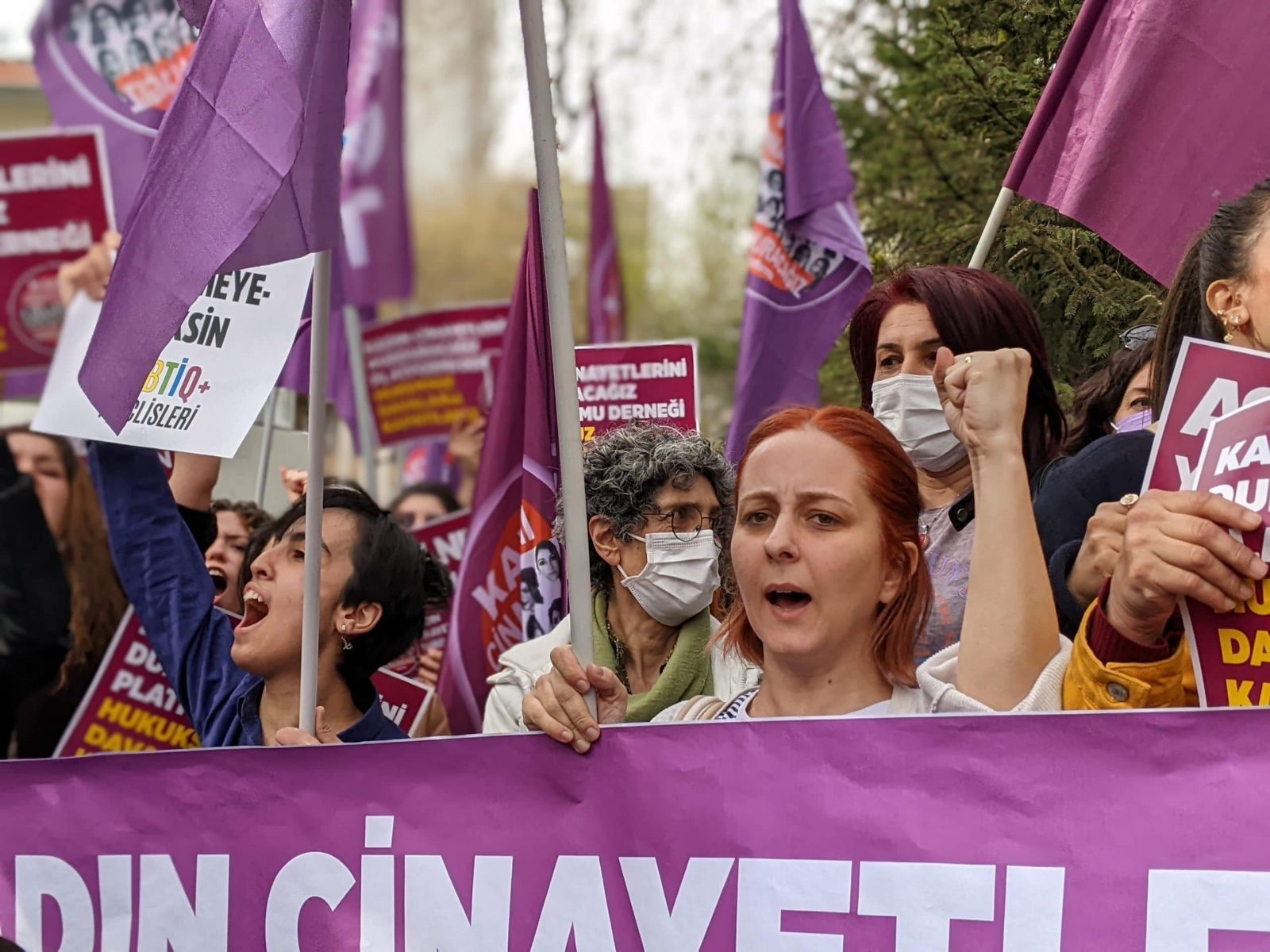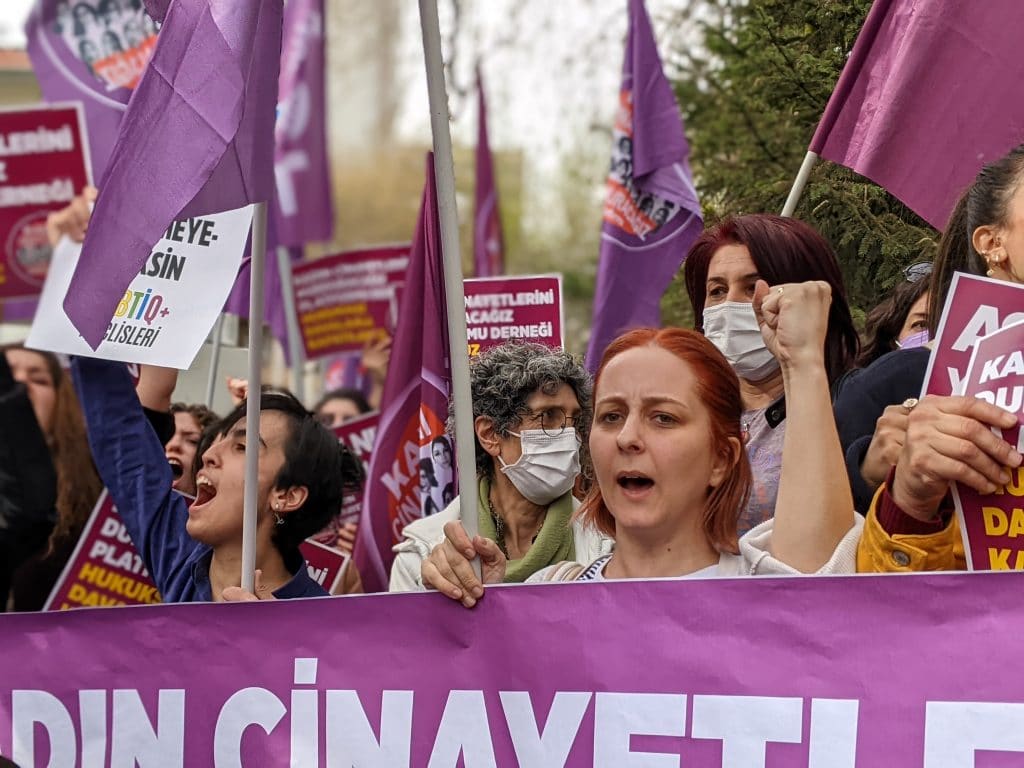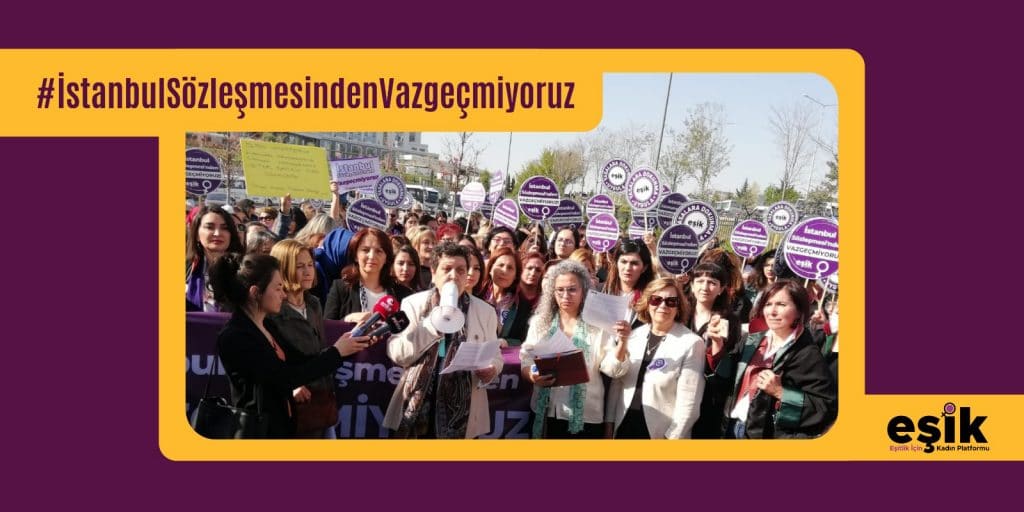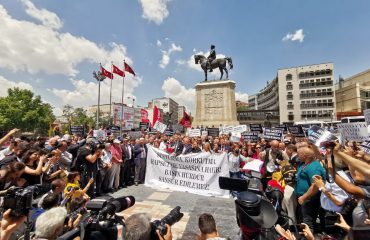

Another day of historical importance in the process of Turkey’s Istanbul Convention will be recorded as April 28, 2022. Today, Turkey’s decision to withdraw from the Istanbul Convention will be brought to trial.
On Thursday, April 28, at 9:45, the 10th Chamber of the Council of State will discuss the 10 cases over 200 applications filed by women organizations, lawyers and bar associations to revert Turkey’s decision to withdraw from Istanbul Convention.
The Women’s Platform for Equality (EŞİK) has called on everyone who wants an equal and non-violent life to attend the 28 April Council of State hearing in Ankara to stand up for the law and the Istanbul Convention.
Upon the call of EŞİK, a big meeting will be held in Ankara tomorrow, with participation of 810 women lawyers from 73 Bar Associations from all over Turkey and more than independent 1000 lawyers.

Turkey withdrew in one sentence
Turkey signed the Istanbul Convention on 11 May 2011, the date on which the convention was opened for signature, and was the first country to ratify it on 14 March 2012. Turkey ratified the convention with no reservations. The convention entered into force on 1 August 2014. As of 1 July 2021, Turkey has withdrawn from the Istanbul Convention and is no longer a party to this convention.
The Istanbul Convention is the most far-reaching international treaty to tackle violence against women and domestic violence. Its comprehensive set of provisions spans wide-ranging preventive and protective measures as well as a number of obligations to ensure an adequate criminal justice response to such serious violations of human rights.
At midnight on Friday, March 19, 2021, it was announced that the Istanbul Convention was terminated by the President’s one-sentence decision.
After the decision, many women, women’s organizations, bar associations, various non-governmental organizations, trade unions, and political parties filed a lawsuit at the Council of State for the stay of execution and the annulment of the decision.
The 10th Chamber of the Council of State rejected more than 200 requests for a stay of execution with the votes of 3 out of 5 members. The dissenting votes in the decision and the opinions given by the prosecutors of the Council of State in the continuation of the process were compatible. The Istanbul Convention, which was approved by the Grand National Assembly of Turkey with the Law No. 6251 and published in the Official Gazette on 29 November 2011, cannot be exited with the decision of the President; According to Articles 87 and 90 of the Constitution, the President does not have the authority to withdraw from international conventions; that the decision cannot be based on the Presidential Decree No. 9; It was also stated by judges and prosecutors.
Call from EŞİK (Women’s Platform for Equality)
In the call text, EŞİK stated that while masculine violence cuts off at least 3 women from life every day and at least three suspicious female deaths are covered every day, the violence has increased gradually after the abolition of the Istanbul Convention. EŞİK announced that the importance of the Istanbul Convention in the fight against violence and the necessity of its effective implementation are increasing day by day.
According to EŞİK: “Withdrawal from the Istanbul Convention is announcing to the whole world that the principle of equality in the Constitution and other laws related to preventing violence and protecting the victims are abandoned and that the state abandons its policy of equality between men and women and prevention of violence against women. Withdrawing from an international convention accepted by law in the Grand National Assembly of Turkey by the decision of a single person has an importance that goes beyond the importance of the Convention itself. This decision means that it can withdraw from all the basic human rights documents that the Convention references and to which Turkey is a party. For this reason, defending the Istanbul Convention is not only the responsibility of women but also of everyone who stands for just and humane life in a democratic country.”
GREVIO Report warned
Let’s go back a bit and recall the Turkey Report dated October 15, 2018, prepared by The Group of Experts on Action Against Violence Against Women and Domestic Violence (GREVIO). GREVIO is an independent human rights monitoring body mandated to monitor the implementation of the Council of Europe Convention on Preventing and Combating Violence against Women and Domestic Violence (“the Istanbul Convention”) by the parties to the convention. The report evaluated the process until 9 May 2018.
In the report, it was written that GREVIO is alarmed over the increasingly restrictive conditions experienced by civil society organizations, in particular independent women’s organizations that have advocated the Istanbul Convention and its principles. They pointed to the urgent need to provide an enabling and conducive environment allowing women’s organizations representing all groups of women to thrive and to co-operate with the authorities in the development and evaluation of policies.
It was determined that women’s organizations in Turkey were effective in achieving great gains for women’s rights, and that violence against women was brought to the public agenda through advocacy and intense campaigning.
They underlined the efforts of women’s organizations during the negotiation process of the Istanbul Convention, including the ratification by Turkey and the subsequent enactment of the Law No. 6284 on the Protection of the Family and the Prevention of Violence against Women.
Shrinking space for human rights organizations
The GREVIO report also contained concerns that non-governmental organizations, especially independent women’s organizations, had to work in increasingly restrictive conditions under what has been termed by those working on the ground and by international institutions as a “shrinking space for human rights organizations”.
In meeting with NGOs, GREVIO witnessed first-hand the difficulties faced by these organizations and the courage and determination of their members, a number of whom face the risk of arrest and or/imprisonment for their overt criticism of government policies. Sadly, the independent women’s organizations who played a historic role in advocating the Istanbul Convention feel they are being denied the authorities’ recognition and support, to the exclusive advantage of more recently established women’s groups.
GREVIO noted that women’s NGOs in Turkey across the political spectrum stand united in saying that there is a lack of a general frame enabling their systematic and effective consultation in the relevant processes. The ability for them to intervene largely depended on the discretion of the authorities. While independent women’s organizations seem to suffer more from this general state of affairs, all NGOs expressed that they could be afforded more opportunities to enter into a constructive dialogue with the authorities to shape and evaluate policies.
Turkey’s Defense
When we look at the answers given by the Turkish authorities to the findings in the report, we see that they do not agree with GREVIO on the comments on the “shrinking space for human rights organizations” in Turkey.
“Turkey has an inclusive and transparent understanding with the principle of zero tolerance for combating violence against women. Activities aiming to increase the synergy between all the women organizations in Turkey are carried out. Within the scope of the Law No. 6284, cooperation activities are carried out with the other institutions and civil society organizations serving in the area of combating violence against women, and these activities will be pursued with the same understanding. The Ministry of Family and Social Policy does not make discrimination among women’s NGOs. Particular attention is being paid to ensure broad participation to the activities as much as possible. In addition, NGOs are encouraged within the bounds of existing circumstances and budget possibilities.
The comment included in the GREVIO report that the NGO members encounter such risks as arrest and/or imprisonment due to making criticisms about the government policies does not go beyond the allegations of the relevant persons and is completely related with legal processes. These processes do not include any issue regarding the actions of the NGO members in the field of women’s rights and so the allegations do not reflect the reality.”
The essence of the word is this: While the Istanbul Convention was annulled by the President’s decision, no opinion was received from the women’s organizations that worked for the signing of this contract.
The women’s organizations that will take their place in front of the Council of State tomorrow will prove whether the answer given by the Ministry of Family and Social Services to the GREVIO report actually corresponds.

